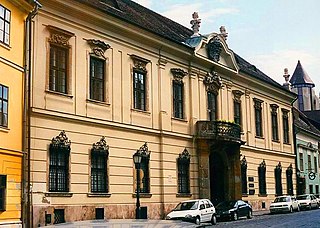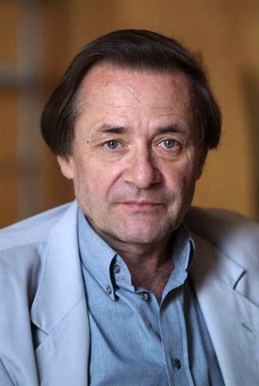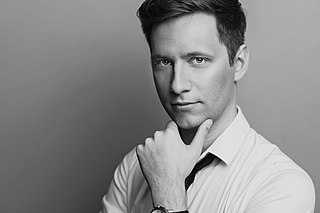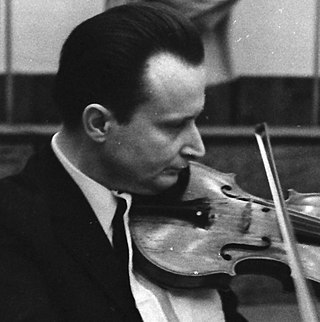External links
| 1960s |
|
|---|---|
| 1970s |
|
| 1980s |
|
| 1990s |
|
| 2000s |
|
| International | |
|---|---|
| National | |
| Academics | |
| Artists | |
| Other | |
Amadinda Percussion Group is a percussion ensemble that was formed in Budapest in 1984 by four musicians, who had just graduated from the Ferenc Liszt Academy of Music.
Since founding the ensemble, their aim has been twofold: to present masterpieces of percussion music unknown to the Hungarian audience, and to perform the music of Hungarian contemporary composers in their country and abroad. One of their principal intentions is to inspire Hungarian and international composers to create new pieces. In recent years, they have also sought to research traditional percussion cultures, to perform original pieces by members of the group, and to transcribe outstanding works for percussion instruments.
From the very beginning, Amadinda has cooperated with world-famous artists like John Cage (recording his complete works for percussion), Steve Reich, Bruno Canino, Peter Eötvös, Rosemary Hardy, András Keller, Zoltán Kocsis, György Kurtág, György Ligeti, András Schiff, Zoltán Jeney and Istvan Marta.

György Kurtág is a Hungarian composer of contemporary classical music and pianist. According to Grove Music Online, with a style that draws on "Bartók, Webern and, to a lesser extent, Stravinsky, his work is characterized by compression in scale and forces, and by a particular immediacy of expression".

Zoltán Kocsis was a Hungarian pianist, conductor and composer.

Budapest has long been an important part of the music of Hungary. Its music history has included the composers Franz Liszt, Ernő Dohnányi, Zoltán Kodály and Béla Bartók and the opera composer Ferenc Erkel.

Ferenc Farkas was a Hungarian composer.

The Franz Liszt Academy of Music is a music university and a concert hall in Budapest, Hungary, founded on November 14, 1875. It is home to the Liszt Collection, which features several valuable books and manuscripts donated by Franz Liszt upon his death, and the AVISO studio, a collaboration between the governments of Hungary and Japan to provide sound recording equipment and training for students. The Franz Liszt Academy of Music was founded by Franz Liszt himself.

András Ligeti was a Hungarian classical violinist and conductor who worked internationally. He was chief conductor of the Hungarian State Opera House until 1985, and chief conductor to the Budapest Symphony Orchestra from 1989 to 1993. He recorded with a focus on Hungarian music and contemporary music.
Barnabás Kelemen is a Hungarian violinist, chamber musician, and professor. He is the founder and artistic director of the Festival Academy Budapest and he co-established the Kelemen Quartet. His work has been recognized with the highest professional and state honors: he has been awarded Liszt, Bartók-Pásztory and Kossuth Prizes, Prima and the London-based Gramophone Awards, and is the holder of the Knight's Cross of the Order of Merit of the Republic of Hungary.
András Szőllősy was the creator of the Szőllősy index, a frequently used index of the works of Hungarian composer Béla Bartók.
The Kodály Quartet is a string quartet founded in 1966 in Budapest, Hungary, originally as Sebestyén Quartet. In 1969, with the approval of the Ministry of Cultural Affairs of the Hungarian Republic, the quartet assumed its present name in honour of the Hungarian composer Zoltán Kodály.

Dezső Ránki is a Hungarian virtuoso concert pianist with a broad repertoire and a significant discography of solo, duo and concerto works.
Balázs Fülei, started to learn music at the age of eight, his first teacher was Katonáné Szabó Judit. In the Bartók Conservatory, Budapest, his professors were Gábor Eckhardt and Balázs Réti, then he made his diploma with honours at the Franz Liszt Academy of Music, Budapest, 2008 in György Nádor, Márta Gulyás and Balázs Réti’s class. Balázs Fülei was an active participant in prof. Amadeus Webersinke, Florent Boffard, Ferenc Rados, Gábor Csalog, Norma Fischer, Zoltán Kocsis, Bertrand Ott, Jan Marisse Huizing, Jan Wijn, Boris Berman and György Kurtág's piano and chamber music courses. Balázs Fülei is living an active musical life as a concert pianist, he gave several concerts almost in every country in Europe, in China, Japan, Australia and in the United States. He was an artist of the International Miami Piano Festival, and the Ferruccio Busoni Festival. He won the 1st prize on the 10th Hungarian National Piano Competition, and in the Andor Földes Piano Competition of Liszt Academy of Music in 2003. He was the winner of the 43. "Arcangelo Speranza" International Piano Competition in Taranto Italy, May 2005, 3rd prize winner of the 25. International Piano Competition „Ettore Pozzoli” in Milan-Seregno in 2007. In 2007 Balázs Fülei got a special prize in the 13. International Tchaikovsky Competition in Moscow. He was selected twice to the New Masters On Tour by The International Holland Music Sessions in The Netherlands and played in 2007 in the Concertgebouw, Diligentia Den Haag and other capitals in Europe. He performed in a DVD recording in May 2006 in Tokyo, Japan with the ballades of Chopin and Liszt, then made his New York debut in Carnegie Hall, 2008. Balázs Fülei plays chamber and contemporary music many times, he played world prémieres of Hungarian composers. He is an artist of the Starlet Music Management.
Budapest Gypsy Symphony Orchestra is a Hungarian symphony orchestra of Romani (Gypsy) musicians. It emphasizes works by composers inspired by Hungarian folk and urban music including Franz Liszt, Johannes Brahms, Vittorio Monti, Piotr Tchaïkovski, Johann Strauss and Johann Strauss II. The orchestra has been performing for 30 years as a classical symphony orchestra.
Márta Fábián is a Hungarian cimbalom player and soloist.
Péter Szalai is a Hungarian tabla player musician
András Keller is a Hungarian violinist and a founder of the Keller Quartet. He also works as a director and conductor of Concerto Budapest.
István Kassai is a Hungarian pianist. He graduated at the Budapest Liszt Academy of Music in 1982 studying in the class of Pál Kadosa. Then in 1984 he pursued his second diploma in the Conservatoire Européen de Musique de Paris under the close supervision of Yvonne Lefébure. During and after his studies he also undertook several master courses, such as the one led by György Cziffra in Senlis and Keszthely, too.

Judit Varga is an Erkel Ferenc Prize and Béla Bartók - Ditta Pásztory Award winner composer, pianist and university lecturer.

Máté Bella is a Junior Prima Award, Erkel Ferenc and Béla Bartók–Ditta Pásztory Prize winner composer and university lecturer.

Aladár Rácz was a Hungarian cimbalom player known for adapting Baroque harpsichord and clavecin repertoire for the cimbalom, which is traditionally a Hungarian folk music instrument. He was the winner of the 1948 Kossuth Prize and influenced the composer Igor Stravinsky to incorporate the cimbalom into his compositions.

Dénes Kovács was a Hungarian classical violinist and academic teacher, described as "pre-eminent among Hungarian violinists". He won the Carl Flesch International Violin Competition in 1955. In his career as a soloist and recording artist, he premiered and recorded the works of 20th-century Hungarian composers, and was also noted for his recordings of Bartók and Beethoven. From 1967 to 1980, he headed the Franz Liszt Academy of Music in Budapest, Hungary's principal music college. He received many national awards including the Kossuth Prize (1963).